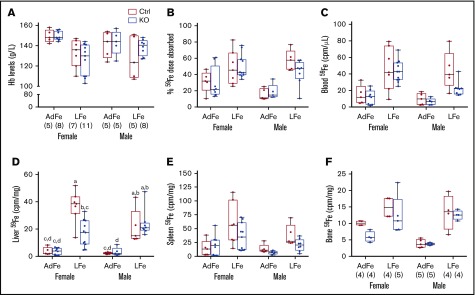Figure 3.
Intestinal Heph is not required for the enhancement of iron absorption after dietary iron restriction. Young, adult mice were placed on iron-adequate (AdFe) or low-iron (LFe) diets for 5 to 6 weeks, and then iron absorption was measured after oral gavage of 59Fe. Blood Hb levels were determined at euthanization (A). Iron absorption (percent) and tissue iron accumulation (cpm) are also shown (B-F). Data are shown as box-and-whisker plots and were analyzed by 3-way ANOVA. A significant diet main effect was noted for all measured parameters (P < .006 for all). A sex main effect was also noted for blood 59Fe levels (P = .0385). A diet × sex interaction was noted for Hb levels (P = .0311). Genotype × sex and 3-way interactions were also noted for liver 59Fe accumulation (P = .0261 for both). Because a significant 3-way interaction was noted for the latter, differences between individual groups were assessed with Tukey's HSD post-hoc test and are noted in panel D; letters atop bars indicate statistically significant differences (P < .05). The number of mice in each group is indicated in parentheses beneath panel A and is the same for data shown in all panels, unless otherwise noted. Also, note that the iron absorption data from control animals are presented in numerical form in Table 1, but all assays were done simultaneously with adults of both sexes and genotypes.

